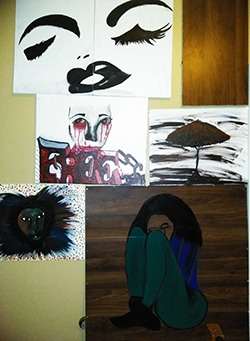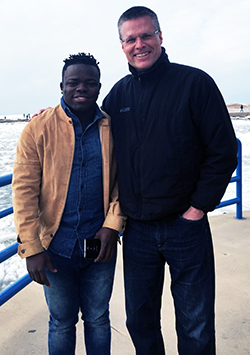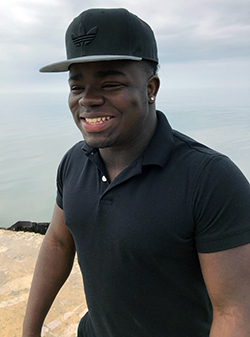Adjy Jean’s story is of a boy on his own traveling through South and Central America at an age when most are in algebra or history class. It’s of adventure, peril, will and the strong forces that compel people to take risks by “following a map and the sky,” — as his mentor put it — in search of something better.
It’s also about adapting to new surroundings, different people, cultures and languages to survive and someday thrive.
From his tiny house in Caledonia where he lives alone, Adjy talked over the phone about his journey, explaining the incredible trek he made from Haiti to Brazil, through eight countries and into California. From there he moved to Pennsylvania and finally to Michigan, where he would begin as a sophomore at East Kentwood High School.
Adjy has an infectious personality: friendly, talkative and worldly. He speaks about leaving behind his mother in Haiti to live with his older siblings in Brazil, and then attempting to follow them as they moved northward without him. His story, told through a child’s lens, has obvious gaps.There are things he chooses not to share and dots only he knows how to connect.

The Youngest in a Large Family
Adjy was born in Port-au-Prince, Haiti, the little brother of five much older children. They had a nice life, he said, more financially stable than most in the impoverished country, but they faced immense loss. Adjy’s big sister, Elvira, died from an illness at age 21 in 2005 and his father, Eugene, died in 2007. After that, he said, the family dispersed. His older brother and two sisters moved to Brazil with their families, leaving Adjy and his mother in Haiti. “They were looking for a new life,” he said.
He missed the interactions with his siblings, and moved to Brazil to join them at age 13. His siblings were busy with their spouses and children.
Adjy faced adult responsibilities.
“I chose them over my mom,” he said, a note of regret in his voice. “Everything changed. I was a man taking care of myself. I had to buy food, pay rent and everything. I was the one who had to take care of myself.”
He knew nobody and wasn’t attending school. He didn’t have money to return to Haiti. After two years, he again made the decision to follow his siblings, who decided to move to the U.S. with their families. His brother made the journey first, and his two sisters went after.
Finally, Adjy set out with his brother-in-law, 7-year-old nephew and a 2-year-old girl, Sarah, whom he calls his cousin.
“I went through Brazil, Ecuador, Colombia, Panama, Costa Rica, Honduras, Guatemala and Mexico. We used every single thing: airplane, bus, train, horse.” He turned 15 along the way.
There are many stories hidden within the story of his journey. Adjy was arrested and released, faced violence and uncertainty about where he would get his next meal. He avoided many dangers youth face when they are alone.
In Mexico, he was separated from his brother in law and nephew. He still protected Sarah, crossing into California, toddler in tow.
“When I crossed the border to the U.S., I turned myself in. I didn’t want to hide. I wanted to be legal,” he said. He told authorities about his brother and sisters, and they called his brother. Instead of immediately taking action to reunite them, however, authorities transported him to a facility that housed children. Sarah was put in a separate area for girls. (The girl would eventually reunite with her mother in the U.S., and, Adjy said “they have a beautiful life.”)
Adjy was eventually moved to a residential facility for unaccompanied youth in Pennsylvania. It was far from his brother, in Florida. Adjy protested, but he would be housed at the facility for 11 months.

Rebelling Against Authority
The facility had strict rules: an early bedtime, limited time for showering and other restrictions. They were boundaries Adjy was not used to. He was told he would have to stay a month, but that turned into two, three, six. He rebelled, believing he would be able to move to Florida with his brother if he caused enough trouble.
“Every single day there was a bad report about me… I didn’t eat nothing, I didn’t talk to anyone,” he said, adding that he had conversations in Creole only with his brother on the phone so no one else could understand. “It made my case more difficult. They didn’t trust me. All the kids were losing the privilege because of me. No one liked me.”
As time passed, other youth who followed the rules left the facility. Adjy decided to ditch the tactic of rebellion. He began to get along with people, form relationships with staff members and help other students with homework and drawing. He is a talented artist.
Ultimately, Adjy’s brother informed him he was moving to Canada, ending his efforts to reunite them. Adjy remained on his best behavior, though his heart was broken. “My good memories were what kept me alive. I lost everything I had. I wasn’t the same person I used to be.”
He focused on starting over yet again.

A New Home, Mentor and Education
One day, Adjy’s caseworker came to tell him he could move to Bethany Christian Services in Kentwood. He eagerly agreed to go, though he knew nothing about Michigan.
Upon arrival, he began living in Casa Del Sol, a home for boys, mostly from Central America.
He followed the rules at Bethany and began attending East Kentwood High School as a sophomore. He also met Tom Heetderks, who would have a huge impact on his life.
Heetderks and his wife, Gwen, are certified mentors through Bethany. They met Adjy, their first mentee, at a coffee shop. He was quiet, declined food or coffee and spoke limited English. They were unsure he was interested in spending time with them until they dropped him off at Casa Del Sol and he asked, “When will I see you again?”
Shocked by his clear English, Heetderks said they answered, “As much as you want to be seen.”
They have become like family since that initial meeting over the past three years, and Heetderks knows many pieces of Adjy’s story. It is similar to thousands of other youth who plead asylum at the border, which Adjy did, Heetderks said. He is an unaccompanied minor refugee and now holds a green card.
Heetderks describes Adjy as having a keen sense of right and wrong, and someone who, despite incredible odds, decided to pursue an education, rising for school every morning, walking to campus, completing his work and seeking help when he needed it. Heetderks also encouraged Adjy to use his skills. Adjy speaks Creole, Portuguese, Spanish, French and English, and now works as translator for Bethany Christian service.
He said knowing Adjy has impacted his life. “Like in any mentoring relationship, those who enter as the mentor gain more and learn more than the mentee themselves.”
Adjy describes Heetderks as the person he needed to help him thrive in the U.S.
“Whenever I feel sad I think about all the ways he has been helping me,” he said.
Heetderks also found Adjy his house.

He said, “I found you a castle. You are going to be the king,” Adjy recalled. “He took me to the house. A tiny home consisting of a bedroom, living room, kitchen and bathroom all in one space for $350 a month. From there, he could walk the 50 minutes to school or take the bus.
Often he walked. One day, Kentwood Public School safety officer Chad Songer saw him, recognizing him from the halls at East Kentwood. Songer offered him a ride, and has been giving him one every morning since.
Adjy said he has enjoyed the past three years at East Kentwood. He was a good student, though he didn’t like geometry and U.S. history. “(At EK) I feel like I am at home,” he said. “They just love me. It was good for me to be there. I was a learner. I made friends and I learned from them.”
He spoke no English when he first arrived in the U.S., and his skills were minimal when he came to Michigan. Now he is fluent. He said he has loved English class with Mrs. Miles. His favorite course is video graphics.
Songer said Adjy helped many peers because of his ability to speak multiple languages, and is always quick to show his appreciation to everyone.
“The first word that comes to mind when I think of Adjy is ‘grateful’. Even in matters I’ve helped him with that seem pretty small or insignificant, he is quick to display his thankfulness,” Songer said. “Adjy isn’t a person that takes things for granted. I think his journey to the United States and his experiences in life have given him a unique perspective on what is important and what isn’t.”
Adjy will attend Grand Rapids Community College in the fall. He already has his student ID and was looking forward to orientation April 10, one of many things canceled due to the COVID-19 pandemic. He also is sad to have missed out on prom, and is hoping to still have graduation. His mother had planned to come from Haiti for his graduation. “I couldn’t wait for those moments to come up.”
After GRCC, Adjy’s goal is to attend Michigan State University. He wants to become a psychologist. “I feel like people always like to talk to me,” he said. “I don’t know why, but they tell me things they never tell anyone else.”
Adjy reflects on his journey, beginning in Haiti.
“I want my mom to be proud of me. What I am today is how she made me, how she raised me. I want to be successful in life for myself and my family, and Tom.”










